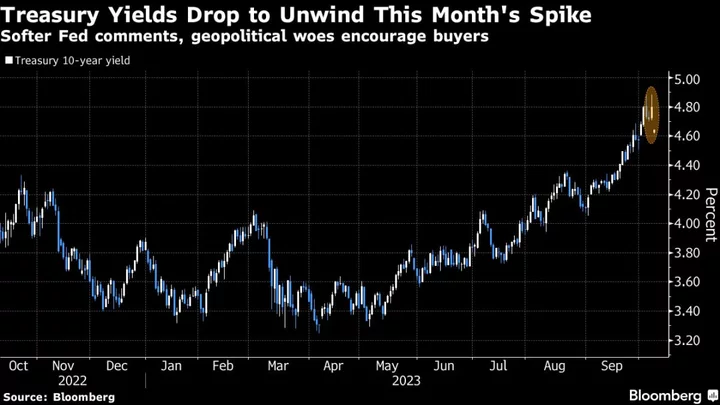Treasuries jumped the most since March after Federal Reserve officials made dovish comments and conflict in the Middle East fueled a flight to safer assets.
Yields on US 10-year notes fell as much as 18 basis points to 4.62% as the cash market reopened following a US holiday on Monday. Two-year yields slipped 16 basis points to 4.93% as investors boosted bets the Fed will keep interest rates unchanged through the end of 2023.
Fed officials “seemed very much on the same page in noting higher bond yields and tighter financial conditions will impact their thinking on the Fed funds rate,” said Andrew Ticehurst, a rates strategist for Nomura Inc. in Sydney. “Market pricing suggests the Fed likely won’t hike this year,” he said, adding there may still be a risk of a final “insurance hike”.
A surge in bond yields over the past month and the outbreak of the Israel-Hamas conflict have emboldened traders to bet the Fed’s most aggressive tightening cycle since the 1980s may be over. Meeting-dated swaps show about a 65% chance the central bank will stay on hold in December — and they are even more confident the Fed won’t hike at any of the other gatherings through to mid-2024.
Fed Vice Chair Philip Jefferson said Monday that he would “remain cognizant of the tightening in financial conditions through higher bond yields” in assessing the future path of policy. Fed official Lorie Logan said the recent rise in long-term Treasury yields may indicate less need for the US central bank to raise rates again.
“With events quickly escalating in the Middle East and the recent bond selloff pushing long-term yields to new multi-decade highs, policymakers will be reluctant to hike,” Althea Spinozzi, senior fixed-income strategist at Saxo Bank A/S, wrote in a research note.
Treasury yields had climbed to their highest levels since 2007, adding to losses for a third-straight year. Some strategists though say it may still be too soon to bet that the selloff in Treasuries is done.
“It might give the Fed extra reason for pause in the short run, but it’s too early to call this justification for the end of the cycle,” Robert Thompson, macro rates strategist at Royal Bank of Canada, said of the recent bond rout.
The Fed’s rate increases have failed to bring inflation back to its 2% target, and the US economy still appears to be resilient — employment data for September released Friday were stronger than expected. Yields also rose this year on anxiety about increased Treasury issuance, which is needed to fund widening government deficits.
(Updates throughout)

